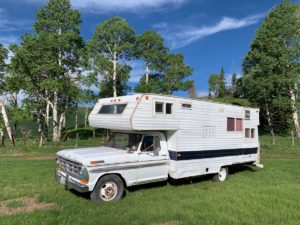Hello Friends,
When I was young, my grandmothers told me stories about my family – about my grandfather who died before I was born who made his living as a professional musician and my great-grandfather who was a teacher and school administrator in the Hawaiian islands, and, on the other side of the family, my other great-grandmother who came to the United States from Poland, raised a large family without speaking much English, and could “pinch nickels until they made dimes.” Visiting extended family in Pennsylvania meant stopping at the cemeteries where loved ones rested and hearing about their lives as immigrants. I learned to value education, hard work, and the courage it takes to leave family and all that is familiar to pursue a better life.
One of my favorite trips to the East included a tour of Revolutionary War sites. Even though my family did not come to the U.S. until the twentieth century, I loved the stories from our founding – the bravery of the men and women who sacrificed to create a new and different nation, the sickness, the shoeless feet in the snow at Valley Forge, the lack of funds and food, followed by the miracles. We know today that these were not perfect people. They had flaws that, by today’s standards, our society finds hard to forgive. And yet, they did great things. We can learn from that because we also are flawed.
Historian, David McCullough, recommends studying history with diligence and attention. “I hope you do this not just because it will make you a better citizen, and it will; not just because you will learn a great deal about human nature and about cause and effect in your own lives, as well as the life of the nation, which you will; but as a source of strength, as an example of how to conduct yourself in difficult times—and we live in very difficult times, very uncertain times.”
If you don’t already, begin now to give to your family the gift of history…their own and their nation’s.
Faithfully for Families,
Tori Black, President
To Change the Future, Children Need History
United Families International: Dedicated to informing you about the issues and forces impacting the family.
Contributed by Jenet Erickson
 I couldn’t help but get a little tearful as I climbed into our old family camper two weeks ago. My mind flooded with memories. Nearly every summer our large family had spent weeks in that 1972, flat-bed-truck-turned-camper, living on tuna fish sandwiches, talking, laughing, teasing, reading aloud, playing games, spraying each other to stay cool, sleeping on makeshift beds while Dad drove long into the night and making thousands of memories that deeply bonded us. We were well aware of how ridiculous we looked. No matter how we tried to “spruce” the camper up, there was no way to hide what it was — an old, dilapidated, terribly outdated, rickety, motorized “covered wagon,”— one you couldn’t help but marvel at each time the engine sputtered then started yet again.
I couldn’t help but get a little tearful as I climbed into our old family camper two weeks ago. My mind flooded with memories. Nearly every summer our large family had spent weeks in that 1972, flat-bed-truck-turned-camper, living on tuna fish sandwiches, talking, laughing, teasing, reading aloud, playing games, spraying each other to stay cool, sleeping on makeshift beds while Dad drove long into the night and making thousands of memories that deeply bonded us. We were well aware of how ridiculous we looked. No matter how we tried to “spruce” the camper up, there was no way to hide what it was — an old, dilapidated, terribly outdated, rickety, motorized “covered wagon,”— one you couldn’t help but marvel at each time the engine sputtered then started yet again.
But it wasn’t just what happened in the camper that meant so much to us. It was where that camper took us. Along with the desire to nurture in their children faith in God, a love for music, and the capacity to work hard and serve, Mom and Dad cared deeply about instilling in us a love for history. And that meant standing in the places where significant historical events had taken place. In that remarkable, old camper, they took us multiple times across the entire United States, so we could see Plymouth Rock, walk across Concord Bridge, climb Breed’s Hill, see the engraving in Washington’s chair in Constitution Hall and stand with Col. Chamberlain on Little Roundtop in Gettysburg.
Family history: building resilience
Dad and Mom believed what historian David McCullough has often expressed: Children are best prepared for the future, if they are given a knowledge of the past. Quoting Librarian of Congress, Daniel Boorstin, McCullough explains, “Trying to plan for the future without a sense of the past is like trying to plant cut flowers.” Mom and Dad did not care that we became history experts. They did care that we had the opportunity to develop strong roots in the nurturing soil of our national and family history.
In the years since, social scientists have shown how children benefit from a knowledge of their family’s history. In one oft-cited study, children who knew more about their family history had higher self-esteem, lower anxiety, lower incidence of behavior problems, a stronger sense of control over their lives and a view of their families as successful. Researcher Marshall Duke found that knowing the stories of their heritage gave children the “sense of being part of a larger family.” A strong “intergenerational self” helped them “capture their core identity,” imbuing them with confidence, a feeling of connection and resilience.
National history: building connection and identity
The same can be true when we learn of our national heritage. A study of history deepens our sense of connection and identity because it requires us to acknowledge our dependence on the work, sacrifices and devotion of others. As McCullough said, “the laws we live by, the freedoms we enjoy, the institutions that we take for granted — are all the work of other people who went before us … How can we not want to know about the people who have made it possible for us to live as we live, to have the freedoms we have? It’s not just a birthright, it is something that others struggled for, often suffered for, often were defeated for and died for — for us, for the next generation.” Knowing who they were and what they gave not only teaches us who we are, but what we must do to ensure that what we were given continues on for those who follow us.
Building resilience as a family and a nation
A study of history strengthens our resilience. We learn of times that were harder and darker than our own, when “division and fear” were tearing us apart, when the fight to protect freedom and human dignity appeared desperate. We witness how hope, courage, and faith in the right saw our nation through the darkness, and in John Mecham’s words, “Lincoln’s better angels found a way to prevail,” over and over again.
This article first appeared in Deseret News.
Caption for photo: Nearly every summer our large family had spent weeks in that 1972, flat-bed-truck-turned-camper, living on tuna fish sandwiches, talking, laughing, teasing, reading aloud, playing games, spraying each other to stay cool, sleeping on makeshift beds while Dad drove long into the night, and making thousands of memories that deeply bonded us.
______________________________________________________________________________________________
 Dr. Jenet Jacob Erickson is an Affiliated Scholar at the Wheatley Institution and former assistant professor in the School of Family Life at BYU. Dr. Erickson’s research specializes in maternal and child wellbeing and has been featured in news outlets including the New York Times, Slate Magazine, and the Today Show. She has authored a number of scientific articles and book chapters and presented at national and international conferences. Read More.
Dr. Jenet Jacob Erickson is an Affiliated Scholar at the Wheatley Institution and former assistant professor in the School of Family Life at BYU. Dr. Erickson’s research specializes in maternal and child wellbeing and has been featured in news outlets including the New York Times, Slate Magazine, and the Today Show. She has authored a number of scientific articles and book chapters and presented at national and international conferences. Read More.

